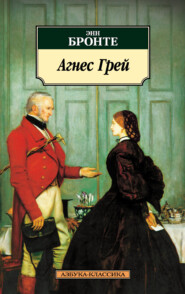По всем вопросам обращайтесь на: info@litportal.ru
(©) 2003-2025.
✖
The Tenant of Wildfell Hall
Настройки чтения
Размер шрифта
Высота строк
Поля
I accordingly dropped the unwelcome topic. And now, Frederick, I think I may bring my letter to a close. From these details you may form your own judgment of the state of my patient, and of my own position and future prospects. Let me hear from you soon, and I will write again to tell you how we get on; but now that my presence is tolerated, and even required, in the sick-room, I shall have but little time to spare between my husband and my son, – for I must not entirely neglect the latter: it would not do to keep him always with Rachel, and I dare not leave him for a moment with any of the other servants, or suffer him to be alone, lest he should meet them. If his father get worse, I shall ask Esther Hargrave to take charge of him for a time, till I have reorganised the household at least; but I greatly prefer keeping him under my own eye.
I find myself in rather a singular position: I am exerting my utmost endeavours to promote the recovery and reformation of my husband, and if I succeed, what shall I do? My duty, of course, – but how? No matter; I can perform the task that is before me now, and God will give me strength to do whatever He requires hereafter. Good-by, dear Frederick.
HELEN HUNTINGDON.
'What do you think of it?' said Lawrence, as I silently refolded the letter.
'It seems to me,' returned I, 'that she is casting her pearls before swine. May they be satisfied with trampling them under their feet, and not turn again and rend her! But I shall say no more against her: I see that she was actuated by the best and noblest motives in what she has done; and if the act is not a wise one, may heaven protect her from its consequences! May I keep this letter, Lawrence? – you see she has never once mentioned me throughout – or made the most distant allusion to me; therefore, there can be no impropriety or harm in it.'
'And, therefore, why should you wish to keep it?'
'Were not these characters written by her hand? and were not these words conceived in her mind, and many of them spoken by her lips?'
'Well,' said he. And so I kept it; otherwise, Halford, you could never have become so thoroughly acquainted with its contents.
'And when you write,' said I, 'will you have the goodness to ask her if I may be permitted to enlighten my mother and sister on her real history and circumstance, just so far as is necessary to make the neighbourhood sensible of the shameful injustice they have done her? I want no tender messages, but just ask her that, and tell her it is the greatest favour she could do me; and tell her – no, nothing more. You see I know the address, and I might write to her myself, but I am so virtuous as to refrain.'
'Well, I'll do this for you, Markham.'
'And as soon as you receive an answer, you'll let me know?'
'If all be well, I'll come myself and tell you immediately.'
Chapter XLVIII
Five or six days after this Mr. Lawrence paid us the honour of a call; and when he and I were alone together – which I contrived as soon as possible by bringing him out to look at my cornstacks – he showed me another letter from his sister. This one he was quite willing to submit to my longing gaze; he thought, I suppose, it would do me good. The only answer it gave to my message was this:-
'Mr. Markham is at liberty to make such revelations concerning me as he judges necessary. He will know that I should wish but little to be said on the subject. I hope he is well; but tell him he must not think of me.'
I can give you a few extracts from the rest of the letter, for I was permitted to keep this also – perhaps, as an antidote to all pernicious hopes and fancies.
* * *
He is decidedly better, but very low from the depressing effects of his severe illness and the strict regimen he is obliged to observe – so opposite to all his previous habits. It is deplorable to see how completely his past life has degenerated his once noble constitution, and vitiated the whole system of his organization. But the doctor says he may now be considered out of danger, if he will only continue to observe the necessary restrictions. Some stimulating cordials he must have, but they should be judiciously diluted and sparingly used; and I find it very difficult to keep him to this. At first, his extreme dread of death rendered the task an easy one; but in proportion as he feels his acute suffering abating, and sees the danger receding, the more intractable he becomes. Now, also, his appetite for food is beginning to return; and here, too, his long habits of self-indulgence are greatly against him. I watch and restrain him as well as I can, and often get bitterly abused for my rigid severity; and sometimes he contrives to elude my vigilance, and sometimes acts in opposition to my will. But he is now so completely reconciled to my attendance in general that he is never satisfied when I am not by his side. I am obliged to be a little stiff with him sometimes, or he would make a complete slave of me; and I know it would be unpardonable weakness to give up all other interests for him. I have the servants to overlook, and my little Arthur to attend to, – and my own health too, all of which would be entirely neglected were I to satisfy his exorbitant demands. I do not generally sit up at night, for I think the nurse who has made it her business is better qualified for such undertakings than I am; – but still, an unbroken night's rest is what I but seldom enjoy, and never can venture to reckon upon; for my patient makes no scruple of calling me up at an hour when his wants or his fancies require my presence. But he is manifestly afraid of my displeasure; and if at one time he tries my patience by his unreasonable exactions, and fretful complaints and reproaches, at another he depresses me by his abject submission and deprecatory self-abasement when he fears he has gone too far. But all this I can readily pardon; I know it is chiefly the result of his enfeebled frame and disordered nerves. What annoys me the most, is his occasional attempts at affectionate fondness that I can neither credit nor return; not that I hate him: his sufferings and my own laborious care have given him some claim to my regard – to my affection even, if he would only be quiet and sincere, and content to let things remain as they are; but the more he tries to conciliate me, the more I shrink from him and from the future.
'Helen, what do you mean to do when I get well?' he asked this morning. 'Will you run away again?'
'It entirely depends upon your own conduct.'
'Oh, I'll be very good.'
'But if I find it necessary to leave you, Arthur, I shall not "run away": you know I have your own promise that I may go whenever I please, and take my son with me.'
'Oh, but you shall have no cause.' And then followed a variety of professions, which I rather coldly checked.
'Will you not forgive me, then?' said he.
'Yes, – I have forgiven you: but I know you cannot love me as you once did – and I should be very sorry if you were to, for I could not pretend to return it: so let us drop the subject, and never recur to it again. By what I have done for you, you may judge of what I will do – if it be not incompatible with the higher duty I owe to my son (higher, because he never forfeited his claims, and because I hope to do more good to him than I can ever do to you); and if you wish me to feel kindly towards you, it is deeds not words which must purchase my affection and esteem.'
His sole reply to this was a slight grimace, and a scarcely perceptible shrug. Alas, unhappy man! words, with him, are so much cheaper than deeds; it was as if I had said, 'Pounds, not pence, must buy the article you want.' And then he sighed a querulous, self-commiserating sigh, as if in pure regret that he, the loved and courted of so many worshippers, should be now abandoned to the mercy of a harsh, exacting, cold-hearted woman like that, and even glad of what kindness she chose to bestow.
'It's a pity, isn't it?' said I; and whether I rightly divined his musings or not, the observation chimed in with his thoughts, for he answered – 'It can't be helped,' with a rueful smile at my penetration.
* * *
I have I seen Esther Hargrave twice. She is a charming creature, but her blithe spirit is almost broken, and her sweet temper almost spoiled, by the still unremitting persecutions of her mother in behalf of her rejected suitor – not violent, but wearisome and unremitting like a continual dropping. The unnatural parent seems determined to make her daughter's life a burden, if she will not yield to her desires.
'Mamma does all she can,' said she, 'to make me feel myself a burden and incumbrance to the family, and the most ungrateful, selfish, and undutiful daughter that ever was born; and Walter, too, is as stern and cold and haughty as if he hated me outright. I believe I should have yielded at once if I had known, from the beginning, how much resistance would have cost me; but now, for very obstinacy's sake, I will stand out!'
'A bad motive for a good resolve,' I answered. 'But, however, I know you have better motives, really, for your perseverance: and I counsel you to keep them still in view.'
'Trust me I will. I threaten mamma sometimes that I'll run away, and disgrace the family by earning my own livelihood, if she torments me any more; and then that frightens her a little. But I will do it, in good earnest, if they don't mind.'
'Be quiet and patient a while,' said I, 'and better times will come.'
Poor girl! I wish somebody that was worthy to possess her would come and take her away – don't you, Frederick?
* * *
If the perusal of this letter filled me with dismay for Helen's future life and mine, there was one great source of consolation: it was now in my power to clear her name from every foul aspersion. The Millwards and the Wilsons should see with their own eyes the bright sun bursting from the cloud – and they should be scorched and dazzled by its beams; – and my own friends too should see it – they whose suspicions had been such gall and wormwood to my soul. To effect this I had only to drop the seed into the ground, and it would soon become a stately, branching herb: a few words to my mother and sister, I knew, would suffice to spread the news throughout the whole neighbourhood, without any further exertion on my part.
Rose was delighted; and as soon as I had told her all I thought proper – which was all I affected to know – she flew with alacrity to put on her bonnet and shawl, and hasten to carry the glad tidings to the Millwards and Wilsons – glad tidings, I suspect, to none but herself and Mary Millward – that steady, sensible girl, whose sterling worth had been so quickly perceived and duly valued by the supposed Mrs. Graham, in spite of her plain outside; and who, on her part, had been better able to see and appreciate that lady's true character and qualities than the brightest genius among them.
As I may never have occasion to mention her again, I may as well tell you here that she was at this time privately engaged to Richard Wilson – a secret, I believe, to every one but themselves. That worthy student was now at Cambridge, where his most exemplary conduct and his diligent perseverance in the pursuit of learning carried him safely through, and eventually brought him with hard– earned honours, and an untarnished reputation, to the close of his collegiate career. In due time he became Mr. Millward's first and only curate – for that gentleman's declining years forced him at last to acknowledge that the duties of his extensive parish were a little too much for those vaunted energies which he was wont to boast over his younger and less active brethren of the cloth. This was what the patient, faithful lovers had privately planned and quietly waited for years ago; and in due time they were united, to the astonishment of the little world they lived in, that had long since declared them both born to single blessedness; affirming it impossible that the pale, retiring bookworm should ever summon courage to seek a wife, or be able to obtain one if he did, and equally impossible that the plain-looking, plain-dealing, unattractive, unconciliating Miss Millward should ever find a husband.
They still continued to live at the vicarage, the lady dividing her time between her father, her husband, and their poor parishioners, – and subsequently her rising family; and now that the Reverend Michael Millward has been gathered to his fathers, full of years and honours, the Reverend Richard Wilson has succeeded him to the vicarage of Linden-hope, greatly to the satisfaction of its inhabitants, who had so long tried and fully proved his merits, and those of his excellent and well-loved partner.
If you are interested in the after fate of that lady's sister, I can only tell you – what perhaps you have heard from another quarter – that some twelve or thirteen years ago she relieved the happy couple of her presence by marrying a wealthy tradesman of L-; and I don't envy him his bargain. I fear she leads him a rather uncomfortable life, though, happily, he is too dull to perceive the extent of his misfortune. I have little enough to do with her myself: we have not met for many years; but, I am well assured, she has not yet forgotten or forgiven either her former lover, or the lady whose superior qualities first opened his eyes to the folly of his boyish attachment.
As for Richard Wilson's sister, she, having been wholly unable to recapture Mr. Lawrence, or obtain any partner rich and elegant enough to suit her ideas of what the husband of Jane Wilson ought to be, is yet in single blessedness. Shortly after the death of her mother she withdrew the light of her presence from Ryecote Farm, finding it impossible any longer to endure the rough manners and unsophisticated habits of her honest brother Robert and his worthy wife, or the idea of being identified with such vulgar people in the eyes of the world, and took lodgings in – the county town, where she lived, and still lives, I suppose, in a kind of close-fisted, cold, uncomfortable gentility, doing no good to others, and but little to herself; spending her days in fancy-work and scandal; referring frequently to her 'brother the vicar,' and her 'sister, the vicar's lady,' but never to her brother the farmer and her sister the farmer's wife; seeing as much company as she can without too much expense, but loving no one and beloved by none – a cold-hearted, supercilious, keenly, insidiously censorious old maid.
Chapter XLIX
Though Mr. Lawrence's health was now quite re-established, my visits to Woodford were as unremitting as ever; though often less protracted than before. We seldom talked about Mrs. Huntingdon; but yet we never met without mentioning her, for I never sought his company but with the hope of hearing something about her, and he never sought mine at all, because he saw me often enough without. But I always began to talk of other things, and waited first to see if he would introduce the subject. If he did not, I would casually ask, 'Have you heard from your sister lately?' If he said 'No,' the matter was dropped: if he said 'Yes,' I would venture to inquire, 'How is she?' but never 'How is her husband?' though I might be burning to know; because I had not the hypocrisy to profess any anxiety for his recovery, and I had not the face to express any desire for a contrary result. Had I any such desire? – I fear I must plead guilty; but since you have heard my confession, you must hear my justification as well – a few of the excuses, at least, wherewith I sought to pacify my own accusing conscience.
In the first place, you see, his life did harm to others, and evidently no good to himself; and though I wished it to terminate, I would not have hastened its close if, by the lifting of a finger, I could have done so, or if a spirit had whispered in my ear that a single effort of the will would be enough, – unless, indeed, I had the power to exchange him for some other victim of the grave, whose life might be of service to his race, and whose death would be lamented by his friends. But was there any harm in wishing that, among the many thousands whose souls would certainly be required of them before the year was over, this wretched mortal might be one? I thought not; and therefore I wished with all my heart that it might please heaven to remove him to a better world, or if that might not be, still to take him out of this; for if he were unfit to answer the summons now, after a warning sickness, and with such an angel by his side, it seemed but too certain that he never would be – that, on the contrary, returning health would bring returning lust and villainy, and as he grew more certain of recovery, more accustomed to her generous goodness, his feelings would become more callous, his heart more flinty and impervious to her persuasive arguments – but God knew best. Meantime, however, I could not but be anxious for the result of His decrees; knowing, as I did, that (leaving myself entirely out of the question), however Helen might feel interested in her husband's welfare, however she might deplore his fate, still while he lived she must be miserable.
A fortnight passed away, and my inquiries were always answered in the negative. At length a welcome 'yes' drew from me the second question. Lawrence divined my anxious thoughts, and appreciated my reserve. I feared, at first, he was going to torture me by unsatisfactory replies, and either leave me quite in the dark concerning what I wanted to know, or force me to drag the information out of him, morsel by morsel, by direct inquiries. 'And serve you right,' you will say; but he was more merciful; and in a little while he put his sister's letter into my hand. I silently read it, and restored it to him without comment or remark. This mode of procedure suited him so well, that thereafter he always pursued the plan of showing me her letters at once, when 'inquired' after her, if there were any to show – it was so much less trouble than to tell me their contents; and I received such confidences so quietly and discreetly that he was never induced to discontinue them.
But I devoured those precious letters with my eyes, and never let them go till their contents were stamped upon my mind; and when I got home, the most important passages were entered in my diary among the remarkable events of the day.
The first of these communications brought intelligence of a serious relapse in Mr. Huntingdon's illness, entirely the result of his own infatuation in persisting in the indulgence of his appetite for stimulating drink. In vain had she remonstrated, in vain she had mingled his wine with water: her arguments and entreaties were a nuisance, her interference was an insult so intolerable that, at length, on finding she had covertly diluted the pale port that was brought him, he threw the bottle out of window, swearing he would not be cheated like a baby, ordered the butler, on pain of instant dismissal, to bring a bottle of the strongest wine in the cellar, and affirming that he should have been well long ago if he had been let to have his own way, but she wanted to keep him weak in order that she might have him under her thumb – but, by the Lord Harry, he would have no more humbug – seized a glass in one hand and the bottle in the other, and never rested till he had drunk it dry. Alarming symptoms were the immediate result of this 'imprudence,' as she mildly termed it – symptoms which had rather increased than diminished since; and this was the cause of her delay in writing to her brother. Every former feature of his malady had returned with augmented virulence: the slight external wound, half healed, had broken out afresh; internal inflammation had taken place, which might terminate fatally if not soon removed. Of course, the wretched sufferer's temper was not improved by this calamity – in fact, I suspect it was well nigh insupportable, though his kind nurse did not complain; but she said she had been obliged at last to give her son in charge to Esther Hargrave, as her presence was so constantly required in the sick-room that she could not possibly attend to him herself; and though the child had begged to be allowed to continue with her there, and to help her to nurse his papa, and though she had no doubt he would have been very good and quiet, she could not think of subjecting his young and tender feelings to the sight of so much suffering, or of allowing him to witness his father's impatience, or hear the dreadful language he was wont to use in his paroxysms of pain or irritation.
The latter (continued she) most deeply regrets the step that has occasioned his relapse; but, as usual, he throws the blame upon me. If I had reasoned with him like a rational creature, he says, it never would have happened; but to be treated like a baby or a fool was enough to put any man past his patience, and drive him to assert his independence even at the sacrifice of his own interest. He forgets how often I had reasoned him 'past his patience' before. He appears to be sensible of his danger; but nothing can induce him to behold it in the proper light. The other night, while I was waiting on him, and just as I had brought him a draught to assuage his burning thirst, he observed, with a return of his former sarcastic bitterness, 'Yes, you're mighty attentive now! I suppose there's nothing you wouldn't do for me now?'
'You know,' said I, a little surprised at his manner, 'that I am willing to do anything I can to relieve you.'
'Yes, now, my immaculate angel; but when once you have secured your reward, and find yourself safe in heaven, and me howling in hell– fire, catch you lifting a finger to serve me then! No, you'll look complacently on, and not so much as dip the tip of your finger in water to cool my tongue!'
















